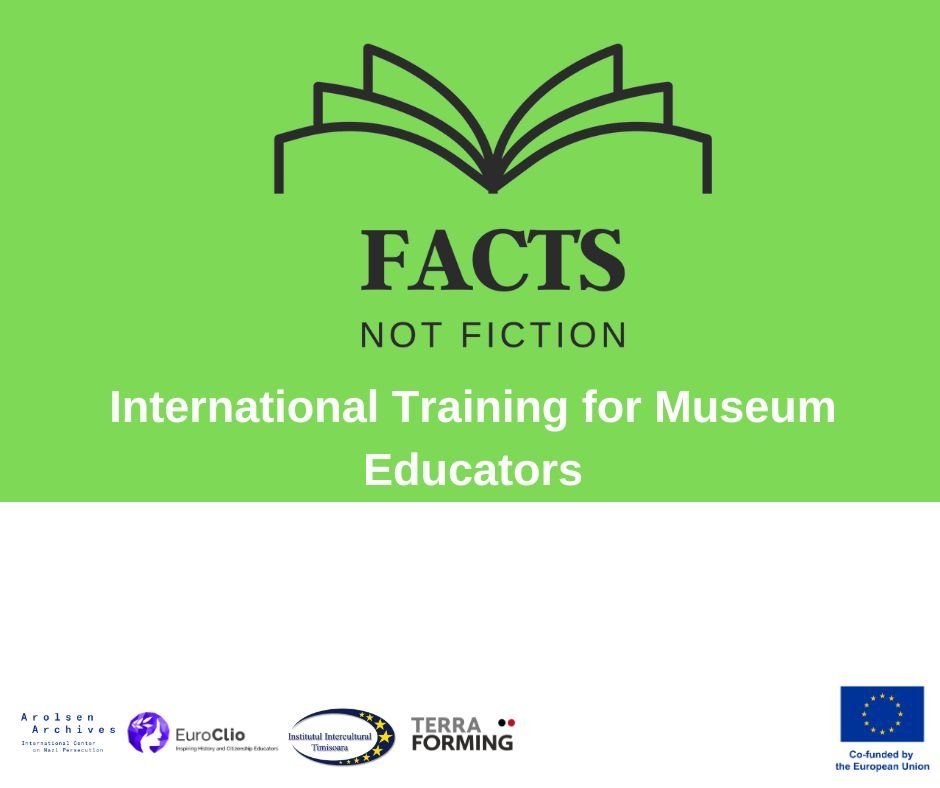Note
THANK YOU. WE RECEIVED MANY APPLICATIONS, AND THE CALL IS NOW CLOSED!

Why is remembrance important? Why do we continue to discuss the legacies of the Nazi regime and their collaborators across Europe today? How can we equip young people to critically engage with the history of the Holocaust and combat misinformation about the Second World War and its legacy?
In partnership with Terraforming, Intercultural Institute Timișoara, and the Arolsen Archives, EuroClio – European Association of History Educators is embarking the project, Facts Not Fiction – Young Historians Show How to Learn from the Past, which aims to empower history educators, museum educators, and other professionals and institutions in the field of memorialization, to train students and youth groups to research local histories of persecution during the Nazi era, and develop their own graphic novels, podcasts, or guided tours based on these findings.
Alongside museum educators, Facts Not Fiction have hosted training events for archivists, teachers and tour guides in addition to conducting workshops with students. Young people in several European countries will then have the chance to research specific local histories related to the Second World War and create their own end-products which may be a graphic novel, podcast, heritage tour or exhibition.
Museum Educators and other professionals will have the chance to give feedback and guidance to students throughout the project and assist in students’ local exhibitions of their chosen microhistories.
For this particular event, we are looking for museum educators and other professionals interested in the Second World War and its incorporation into museum and gallery exhibitions. Those interested in the history of totalitarianism, the Holocaust memorial, and mid-20th century histories of migration and persecution should apply. While the project is primarily focused on the persecution carried out by the Nazis and their collaborators, those with little/no background in the Second World War as well as those with experience in other related areas of history are also encouraged to submit an application. For example, those who have worked on museums relating to the persecution of the Roma and Sinti or queer and disabled communities by authoritarian regimes. If your professional experience is in a period/ location that is more distinct, but you still feel that it explores related themes, please elaborate in your application.
The training will take place in The Hague on September 29 to October 1 with September 29 as the day of arrival for international participants.
Based on project partners, this opportunity is intended for individuals residing in Germany, Serbia, the Netherlands, and Romania. EuroClio is looking to recruit museum educators specifically living in Finland and the Netherlands.
Applications from Serbia, Romania and Germany will be forwarded to the partners for review: Terraforming (Serbia), Intercultural Institute Timișoara (Romania), and Arsolen Archives (Germany).
Opportunity to be involved in the local history projects developed by the teachers and students throughout the incoming months, from September 2024 to June 2025.
We will cover all expenses related to your travel to/from The Hague, including accommodation and subsistence costs. The day of arrivals will be September 29 and the workshop will end on October 1 in the afternoon. Two nights of accommodation will be covered.
The application period will open from mid-August. Please send us a letter of motivation detailing your interest in the project, including an explanation of relevant archives and/ or contact@terraforming.org source materials you have worked with. Please also attach a copy of your CV and send both to before September 8. For applicants based in the Netherlands who don’t have to travel, we will still be accepting applications later in September.
Applicants will be accepted on a rolling basis, so we encourage you to apply early!